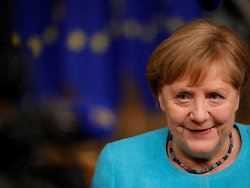Friday June 25th 2021
Russia proposal fails
Merkel would have liked more courage
After the US-Russia summit, the Chancellor is promoting a similar format with the Kremlin boss in the EU. But many heads of state don’t want to talk to Putin. But the most violent argument is about another issue: Hungary’s law on homosexuality and the question of how compatible it is with the values of the EU.
The EU states have agreed on stricter action against future violations of the law by Russia. However, at the EU summit, Chancellor Angela Merkel was unable to prevail with the suggestion that another high-level meeting with Russian President Vladimir Putin should also be considered. “It was not possible today to agree that we would meet immediately at management level, that is, at executive level,” said Merkel during the night in Brussels. The formats and conditions for a dialogue with Russia are now being worked on. “Personally, I would have liked a more courageous step here,” said the CDU politician at the end of the first day of the summit.
Merkel and French President Emmanuel Macron had campaigned for a change of course in Russia policy: on the one hand, tougher, coordinated sanctions for violations of the law by Russia, on the other hand, the option of EU top meetings with Putin. However, many EU countries had concerns.
Only the development of a plan for punitive measures, which also includes economic sanctions, was decided. There is “a need for a determined and coordinated response from the EU and its member states to any further malicious, illegal and disruptive activity by Russia,” the summit statement said.
Hungary discussion “controversial but very honest”
Germany and France had caused quite a stir with their advance. But another issue sparked much more controversy: the new Hungarian law on homosexuality. Many of the 27 heads of state and government tackled Hungarian Prime Minister Viktor Orban behind closed doors. According to diplomats, some even asked why Hungary was still a member of the EU at all.
Merkel confirmed a “controversial but very honest discussion”. Such talks would be needed more often because there were different ideas about the future of Europe, not just with Hungary, said Merkel. Orban denied that the law discriminated against sexual minorities. Most of his EU colleagues see it differently. The Luxembourg Prime Minister Xavier Bettel, who is married to a man, said, according to participants: “My mother hates that I am gay, I have to live with that. And now you are writing that into a law.”
Hungarian law prohibits publications that are accessible to children and that depict non-heterosexual relationships. It also bans advertising in which homosexuals or transsexuals appear as part of normalcy. Merkel and many of her EU colleagues see basic European values in danger.
No progress on asylum policy
Despite the bitter dispute, the heads of state and government found a common line on a number of important issues. In the fight against the corona pandemic, according to participants, they agreed to only open the borders to travelers from third countries carefully and in a coordinated manner. The aim is to slow the spread of the dreaded delta variant of the coronavirus. Travelers from Great Britain, where this mutant is already very common, could be affected.
The summit participants quickly came to an agreement on declarations on Turkey and migration policy. With a view to Turkey, they affirm the will to intensify cooperation on certain issues under certain conditions. The EU Commission is to develop a specific proposal for further financial aid for Syrian refugees in Turkey. An amount of 3.5 billion euros by 2024 is being considered.
When it comes to migration, the dispute over the common asylum policy has stalled. The declaration therefore concentrated on external aspects, i.e. agreements with countries of origin and transit countries in order to prevent people from fleeing to Europe.
.
